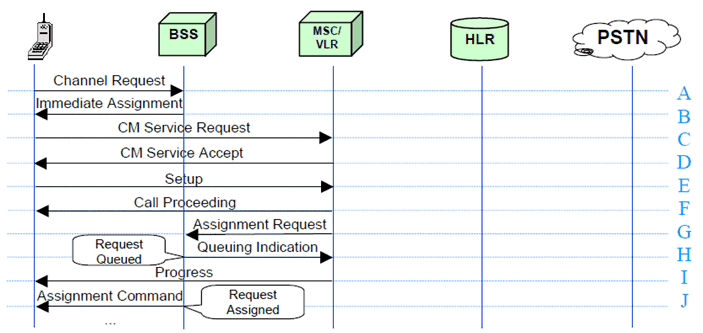Content for TR 22.952 Word version: 18.0.1
0…
4…
4.8…
5
5.1
5.2
5.3
5.4
5.5
5.6
5.7
5.8
5.9
5.10
5.11
5.12
5.13
6…
A…
B
B.1
B.2
B.3
B.4
B.5
B.6
B.7
B.8
B.9
C
D…
5.3 Priority service call origination - radio resources unavailable, call queued p. 21
This clause illustrates a MO Priority Service call establishment with early assignment for a Service User. In this scenario, radio traffic channels are not available when the Priority Service call is attempted, the Priority Service request is queued, and call establishment proceeds when a radio traffic channel becomes available.

A-G.
Same as described in steps A-G of Clause 5.1.
H.
As no radio traffic channel is available on receipt of the Assignment Request, the BSS places the Assignment Request in a queue based on the Service User's priority level and call initiation time at the cell. The BSS returns a Queuing Indication message to the MSC/VLR and starts BSSMAP timer T11. The BSSMAP timer T11 specifies the allowed queuing delay for the call and is determined by the Service Provider.
I.
On receipt of the Queuing Indication message, the MSC/VLR sends a Progress message to the MS. The Progress message includes the progress indicator information element with progress description set to #64 "Queuing". On receipt of the Progress message, the MS stops all CC timers related to the call, including CC timer T310.
J.
When an idle radio traffic channel becomes available before BSSMAP timer T11 expires, the BSS stops timer T11, sends an Assignment Command message to the MS on the main signalling link, and starts BSSMAP timer T10 and RR timer T3107.
K-R.
Same as described in steps I-P of Clause 5.1.